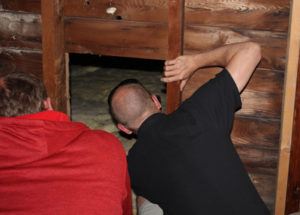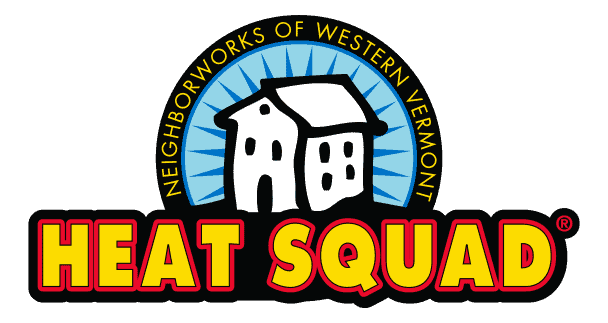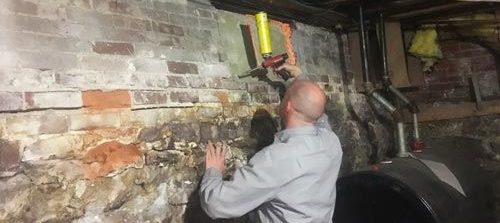We spend a lot of time in our homes- eating dinner, watching TV, helping our kids do their homework, and SLEEPING, to name a few. Our homes are the place we can rely on to be there, day after day, providing shelter for our families.
But what if your home was making you sick without you realizing it?
What’s behind the paint and in your carpet can have a major impact on your health. A lot of us have experienced symptoms from a sick home without realizing it.
For example, after spending quality time in your home, have you ever:
- Woken up with a headache many times?
- Experienced persistent sneezing?
- Had trouble breathing or a shortness of breath?
- Had occasional runny noses or itchy/watery eyes?
- Started coughing more than usual?
- Gotten unexpected bloody noses?
These symptoms, and many others, can be caused by unseen pests, allergens hiding in carpets or pillows, water leaking where you can’t see it, mold and mildew, invisible gases, and, of course, our furry housemates.
What could make you sick in your home?
Mold & Moisture
Mold can grow anywhere in the home with enough moisture, and can cause structural damage to the home by rotting wood structural members as well as discolor walls and floors.
Mold can grow on walls, ceilings, furniture, concrete, and carpets- anywhere there is cellulose, a plant matter, found in wood, drywall, fabrics, and dust.
It causes a number of upper respiratory issues, including sneezing, runny or stuffy noses, coughing, postnasal drip, and itchy or watery eyes. Symptoms vary from person to person and may change seasonally with the amount of moisture available.
Indoor Air Quality
There are two gases that you should monitor in your home: radon and carbon monoxide.
In Vermont, we’ve got a lot of rocks- and while this is great for rock wall building, it often means that there is radon that seeps up into our homes. Radon is the second leading cause of lung cancers in the U.S. after smoking– needless to say, it’s not something you want in your home.
Carbon monoxide is another colorless and odorless gas you’ll want to monitor. This gas is the leading cause of poisoning deaths in the U.S., so you want to make sure you’re alerted if levels get too high.
Pests
In Vermont, there are three pests you should watch out for: mice, dust mites, and bedbugs.
We’re all familiar with the constant battle against mice. Unfortunately, mice are more than just a nuisance- their dander and feces can increase the symptoms of allergies and asthma. Mice can fit through holes the size of a dime.
Dust mites are microscopic pests that generate allergens by feeding on dead human skins cells and creating fecal matter, which fall on the carpet and furnishings.
Bedbugs are bloodsuckers that hitch rides into your house on belongings, whether it’s your clothing or that cute loveseat you picked up at a second-hand shop. Their bites are annoying and can develop a rash.
Allergens & Irritants
These include dust, pollen, animal dander, mold and moisture, cigarette smoke, fragrances, and cleaning products that can trigger asthma symptoms. Many homes contain these triggers and irritants, and they can be eliminated through simple changes or home repairs, like tightening up the home.
Fortunately, they can all be cured- the first step is discovering the problem.
Identify Health Issues with an Energy Audit
The HEAT Squad understands the importance of keeping your home healthy.
 This is why our Energy Audits cover more than just the energy efficiency of your home- our energy auditors also look for ways to keep your home healthy and safe.
This is why our Energy Audits cover more than just the energy efficiency of your home- our energy auditors also look for ways to keep your home healthy and safe.
During our Energy Audits, our experienced energy auditors know what to look for and test to make sure your home is keeping you healthy.
If our energy auditors discover something in your home that may be affecting your health, they are able to offer recommendations for the elimination, remediation, or repair of the issue.
[vc_btn title=”Schedule an Energy Audit!” color=”green” align=”center” link=”url:http%3A%2F%2Fheatsquad.org/get-started-with-heat-squad/%2F||target:%20_blank|”]
Six Ways to Keep Your Home Healthy
1. Reduce humidity
- Identify leaks or places moisture is entering the home and fix them- your energy auditor can help you with this.
- Use a dehumidifier or air conditioner to maintain humidity at 50% or lower. Your energy auditor will be able to help determine the humidity level in your home and let you know if it is too high (or too low).
- Vent bathrooms and dryers outside. Use kitchen and bathroom vents regularly while cooking or showering. Our energy auditors check that vents are working correctly and identify the problems if they are not.
- Check regularly for leaks in faucets, pipes, and ductworks and repair- our energy auditors cover this in their home evaluation.
2. Replace or remove carpets
- Carpets trap pollutants like dust mites, pet dander, mold spores, dirt, and dust. These should be kept clean with regular vacuuming with a HEPA filter and replaced every 5-10 years.
- Carpets should be removed from bedrooms whenever possible, especially for asthma sufferers.
3. Repair or replace heating and ventilation systems
- Your energy auditor will thoroughly inspect your heating and ventilation systems to make sure they are working correctly and efficiently and that no moisture is leaking or being captured by accident.
4. Seal crevices in the house
- You energy auditor will identify places where mice may be sneaking in and recommend ways to keep them out by air sealing.
5. Monitor radon and carbon monoxide levels
- HEAT Squad energy auditors carry carbon monoxide detectors, gas leak detectors, and have combustion analyzers to detect for carbon monoxide issues. They will be able to help you decide how to mitigate or eliminate these harmful gases.
- Obtain a free radon kit from the VT Department of Health.
6. Clean, wash, and dust regularly
- Vacuum with a HEPA filter

- Damp mop floors
- Wash all bedding once a week
- Dust with a wet cloth
- Clean with vinegar or soap and water
- Use Dust Mite Covers where possible
- Keep pets out of the bedroom, especially of asthma sufferers
Schedule your low-cost HEAT Squad energy audit today and learn how to make and keep your home healthy, safe, efficient, and affordable.
[vc_btn title=”Schedule an Energy Audit!” color=”green” align=”center” link=”url:http%3A%2F%2Fheatsquad.org/get-started-with-heat-squad/%2F||target:%20_blank|”]
Helpful Links:
American Lung Association: http://www.lung.org/our-initiatives/healthy-air/indoor/
Healthy Homes Coalition: http://www.healthyhomescoalition.org/asthma







